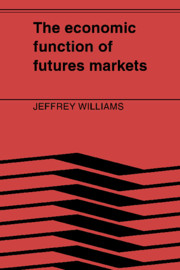Book contents
- Frontmatter
- Contents
- Preface
- 1 An introduction to futures markets
- 2 Equivalent ways to borrow and lend commodities
- 3 Futures markets and risk aversion
- 4 The demand to borrow commodities
- 5 The contribution of futures markets
- 6 The optimal number of futures markets
- 7 Conclusion: The economic function of futures markets
- Glossary of trade terms
- Reference list
- Index
5 - The contribution of futures markets
Published online by Cambridge University Press: 06 October 2009
- Frontmatter
- Contents
- Preface
- 1 An introduction to futures markets
- 2 Equivalent ways to borrow and lend commodities
- 3 Futures markets and risk aversion
- 4 The demand to borrow commodities
- 5 The contribution of futures markets
- 6 The optimal number of futures markets
- 7 Conclusion: The economic function of futures markets
- Glossary of trade terms
- Reference list
- Index
Summary
The previous chapter emphasized that firms hold inventory as a response to the costs of producing, moving, and processing commodities quickly. Not surprisingly, there are other possible responses to inflexible and uncertain production and processing, such as vertical integration, horizontal integration, or versatile equipment. But even if other responses are used to some degree, in many instances it will be cheapest for firms to buy access to materials. To borrow a commodity implicitly through a hedging operation involving a futures contract is one method of obtaining accessibility for a stretch of time. Thus, it is a demand for access that leads to the contribution of futures markets as organized implicit loan markets for commodities. This chapter will put the contribution of futures markets into a more general setting, and will seek to explain why futures markets are the dominant institution for borrowing and lending commodities.
Others, of course, have argued that the contribution of futures markets is something besides that of organized implicit loan markets for commodities. The idea of futures markets as markets for price insurance has been discussed in Chapter 3, and the idea of them as markets for information will be discussed in the next chapter. Yet another strand in the literature has emphasized the features of futures markets as institutions, namely the standardization of contracts, the margin system, and the operation of clearinghouses, as what makes them special. The discusssion of the institutional responses to inflexibilities in producing and processing commodities extends naturally to a consideration of this theory that futures markets are superior to informal forward markets because futures contracts allow impersonal, highly organized trading.
- Type
- Chapter
- Information
- The Economic Function of Futures Markets , pp. 150 - 179Publisher: Cambridge University PressPrint publication year: 1986



